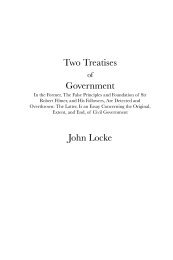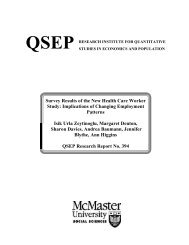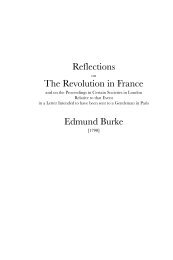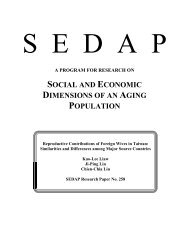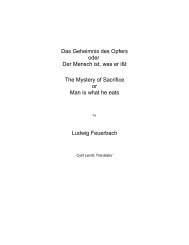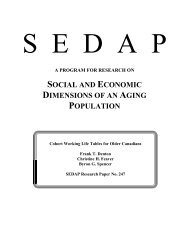AGRICULTUREwife <strong>of</strong> Thos. Lyne. Tobacco none planted. VagrantsMary How, an Irish woman and her sister were takenand punished according to the Statute and sent awayby pass with a guide towards Ireland in the County <strong>of</strong>Cork.": or as in another report " We have no bakers oralehouses within our parish. We cannot find by oursearches at night or other time that any rogues orvagabonds are harboured saving Mr. Edward Hall wholodged a poor woman and her daughter. We do notsuffer any vagrants which we see begging in our parishbut we give them punishment according as we ought."'A review <strong>of</strong> the whole position <strong>of</strong> <strong>women</strong> in Agricultureat this time, shows the existence <strong>of</strong> FamilyIndustry at its best, and <strong>of</strong> Capitalism at its worst.The smaller farmers and more prosperous husbandmenled a <strong>life</strong> <strong>of</strong> industry and independence in which everycapacity <strong>of</strong> the <strong>women</strong>, mental, moral and physicalhad scope for development and in which they couldsecure the most favourable conditions for their children-while among capitalistic farmers a tendency canalready be perceived for the <strong>women</strong> to withdraw fromthe management <strong>of</strong> business and devote themselvesto pleasure. At the other end <strong>of</strong> the scale Capitalismfed the man whom it needed for the production <strong>of</strong>wealth but made no provision for his children ; andthe married woman, handicapped by her family ties,when she lost the economic position which enabled herthrough Family Industry to support herself and herchildren, became virtually a pauper.Bund (J. W. Willis) Worcestnrbire CO Rec., Vol. I., p. 564, 1634.' Zbid, Vol. I, p. 571, 1634.TEXTILES.(A) Introductory. Historical importance in <strong>women</strong>'s economic development-Predominance <strong>of</strong> <strong>women</strong>'s labour-Significance in development <strong>of</strong> ,Industrialism-Lowwages.(R) lYoollen Trade. Historical importance-Proportions <strong>of</strong> men and <strong>women</strong>employed-Early experiments in factory system abandoned-Declining employment<strong>of</strong> <strong>women</strong> in management and control-Women LVeavers-Burllng-Spinning-Organization <strong>of</strong> spinning industry-Women who bought wool andsold yarn made more pr<strong>of</strong>it than those who worked for wages-Methods <strong>of</strong>spinning-Class <strong>of</strong> <strong>women</strong> who span for wages-Rates <strong>of</strong> wages-Disputesbetween spinsters and employers-Demoralisation <strong>of</strong> seasons <strong>of</strong> depresslon-Association <strong>of</strong> men and <strong>women</strong> in trade disputes.(C) Linen. Chiefly a domestic industry-Introduction <strong>of</strong> Capitalism-Increaseddemand caused by printlng linens-Attempt to establish a company-Part takrn by <strong>women</strong>-weaulng-bleaching-spinning-Wages below subslstencelevel-Encouragement <strong>of</strong> spinning by local authorities to lessen poorrelief-rirmin.(D) Silk. Gold and Silver. Silk formerly a monopoly <strong>of</strong> gentle<strong>women</strong>-In<strong>seventeenth</strong> <strong>century</strong> virtually one <strong>of</strong> the pauper trades. Gold and Silverfurnished employment to the poorest class <strong>of</strong> <strong>women</strong>-Factory system alreadyIn use.(E) Conclusion.FROM the general economic standpoint, the textileindustries rank second in importance to agricultureduring the <strong>seventeenth</strong> <strong>century</strong>, but in the history <strong>of</strong><strong>women</strong>'s economic development they hold a positionwhich is quite unique. If the food supply <strong>of</strong> thecountry depended largely on the work <strong>of</strong> <strong>women</strong> inagriculture, their labour was absolutely indispensableto the textile industries, for in all ages and in allcountries spinning has been a monopoly <strong>of</strong> <strong>women</strong>.This monopoly is so nearly universal that we maysuspect some physiological inability on the part <strong>of</strong>men to spin a fine even thread at the requisite speed,and spinning forms the greater part <strong>of</strong> the labour inthe production <strong>of</strong> hand-made textile fabrics.
94 TEXTILES TEXTILESIt requires some effort <strong>of</strong> the imagination in thismechanical age to realize the incessant industry whichthe duty <strong>of</strong> clothing her own family imposed on everywoman, to say nothing <strong>of</strong> the yarn required for thefamous Woollen Trade. The service rendered by<strong>women</strong> in spinning for the community was comparedby contemporaries to the service rendered by themen who ploughed. " Like men that would lay nohand to the plough, and <strong>women</strong> that would set nohand to the wheele, deserving the censure <strong>of</strong> wiseSolomon, Hee that would not labour should not eat."'Textile industries fall into three groups : Woollen,Linen, and Miscellaneous, comprising silk, etc. Cottonis seldom mentioned although imported at this timein small quantities for mixture with linen.The predominance <strong>of</strong> <strong>women</strong>'s labour in the textiletrades makes their history specially significant intracing the evolution <strong>of</strong> <strong>women</strong>'s industrial positionunder the influences <strong>of</strong> capitalism ; for the woollentrade was one <strong>of</strong> the first fields in which capitalisticorganization achieved conspicuous success.The importance <strong>of</strong> the woollen trade as a source <strong>of</strong>revenue to the Crown drew to it so much attention thatmany details have been preserved concerning itsdevelopment ; showing with a greater distinctnessthan in other and more obscure trades, the steps bywhich Capitalistic Organization ousted Family Industryand the Domestic Arts. It is surely not altogetheraccidental that Industrialism developed so remarkablyin two trades where the labour <strong>of</strong> <strong>women</strong> predominated-in the woollen trade which in the <strong>seventeenth</strong><strong>century</strong> was already organized on capitalistic lines, and,one hundred years later, in the cotton trade.Some characteristic features <strong>of</strong> modern Industrialismwere absent from the woollen trade in the <strong>seventeenth</strong><strong>century</strong>. The work <strong>of</strong> men and <strong>women</strong> alike was carriedDccloration <strong>of</strong>tbc Estate <strong>of</strong> Clothing, p. 2, 1613.on chiefly at home, and thus the employment <strong>of</strong> married<strong>women</strong> and children was unimpeded ; nor are there anysigns <strong>of</strong> industrial jealousy between men and <strong>women</strong>,who on the contrary, stand by each other during thisperiod in all trade disputes. Nevertheless, the position<strong>of</strong> the woman wage-earner in the textile trades wasextraordinarily bad, and this in spite <strong>of</strong> the fact thatthe demand for her labour appears nearly always tohave exceeded the supply. The evidence contained inthe following chapter shows that the wages paid to<strong>women</strong> in the <strong>seventeenth</strong> <strong>century</strong> for spinning linenwere insufficient, and those paid for spinning wool,barely sufficient, for their individual maintenance, andyet out <strong>of</strong> them <strong>women</strong> were expected to support, orpartly support, their children.Possibly the persistence <strong>of</strong> such low wages throughoutthe country was due in a measure to the convenience<strong>of</strong> spinning as a tertiary occupation for married<strong>women</strong>. She who was employed by day in the intervals<strong>of</strong> household duties with her husband's businessor her dairy and garden, could spin through the longwinter evenings when the light was too bad for otherwork. The mechanical character <strong>of</strong> the movements,and the small demand they make on eye or thought,renders spinning wonderfully adapted to <strong>women</strong> whoseserious attention is engrossed by the care or training<strong>of</strong> their children. A comparison <strong>of</strong> spinster's wageswith those <strong>of</strong> agricultural labourers, which were alsobelow subsistence level, will show however that suchan explanation does not altogether meet the cse.The fact is that far from underselling the spinsters1who were wholly dependent on wages for their living,it seems probable that the <strong>women</strong> who only span forsale after the needs <strong>of</strong> their own households had beensupplied, received the highest rates <strong>of</strong> pav, just as thehusbandman, who only worked occasionaily for wages,' Spinster in the seventrenth <strong>century</strong> is used in its technical sense and refersequally to <strong>women</strong> who are married, unmarned or w~dows.
- Page 1 and 2: WORKING LIFE OF WOMENIN THESEVENTEE
- Page 3 and 4: PREFACEboth can be studied in the w
- Page 5 and 6: 2 INTRODUCTORY INTRODUCTORY 3is det
- Page 7 and 8: INTRODUCTORYThese circumstances hav
- Page 9 and 10: 10 INTRODUCTORY INTRODUCTORYthis pe
- Page 11 and 12: CAPITALISTSTerm includes aristocrac
- Page 13 and 14: CAPITALISTSA granddaughter of Olive
- Page 15 and 16: CAPITALISTSsuch as noe way entangle
- Page 17 and 18: 26 CAPITALISTS CAPITALISTS 27Wellin
- Page 19 and 20: 30 CAPITALISTS CAPITALISTS 3'years
- Page 21 and 22: CAPITALISTSboth, so that there coul
- Page 23 and 24: 38 CAPITALISTShis Lady was taking d
- Page 25 and 26: AGRICULTURE 43AGRICULTUREAgricultur
- Page 27 and 28: AGRICULTURE AGRICULTURE 47two Weeks
- Page 29 and 30: AGRICULTUREFitzherbert's descriptio
- Page 31 and 32: 54 AGRICULTUREamong the gentry. The
- Page 33 and 34: 5 8 AGRICULTURE AGRICULTURE 59was u
- Page 35 and 36: 62 AGRICULTURE AGRICULTURE 63" Spre
- Page 37 and 38: AGRICULTUREthe same work,' a marrie
- Page 39 and 40: AGRICULTUREThe Justices in the Nort
- Page 41 and 42: AGRICULTUREIn some places the labou
- Page 43 and 44: AGRICULTURELabourers naturally were
- Page 45 and 46: 82 AGRICULTURE AGRICULTUREdenyed a
- Page 47 and 48: AGRICULTUREpayne of xs a weeke and
- Page 49: AGRICULTUREThe conduct of the magis
- Page 53 and 54: TEXTILESchildren were said to be em
- Page 55 and 56: TEXTILES TEXTILES 103respect obtain
- Page 57 and 58: TEXTILES TEXTILES'07people who had
- Page 59 and 60: I 10 TEXTILES TEXTILES I111693 to p
- Page 61 and 62: I 14 TEXTILES TEXTILES 115books,' b
- Page 63 and 64: 118 TEXTILES TEXTILES 119money in p
- Page 65 and 66: 122 TEXTILES TEXTILES 123clothing w
- Page 67 and 68: 126 TEXTILES TEXTILESclosely imitat
- Page 69 and 70: 1 30TEXTILESspinsters' maximum wage
- Page 71 and 72: TEXTILESa mownte in the yere t o jM
- Page 73 and 74: '38 TEXTILES TEXTILESD. Silk, and G
- Page 75 and 76: 142TEXTILES TEXTILES '43end. And it
- Page 77 and 78: TEXTILESbranches of the woollen ind
- Page 79 and 80: CRAFTS AND TRADESCHAPTER V.--CRAFTS
- Page 81 and 82: CRAFTS AND TRADES CRAFTS AND TRADES
- Page 83 and 84: I 58CRAFTS AND TRADESwith the wife
- Page 85 and 86: CRAFTS AND TRADES CRAFTS AND TRADES
- Page 87 and 88: CRAFTS AND TRADES. . . . shall teac
- Page 89 and 90: I 70 CRAFTS AND TRADES CRAFTS AND T
- Page 91 and 92: CRAFTS AND TRADESone month the Mast
- Page 93 and 94: 178 CRAFTS AND TRADES CRAFTS AND TR
- Page 95 and 96: 182 CRAFTS AND TRADES CRAFTS AND TR
- Page 98 and 99: I 88 CRAFTS AND TRADES CRAFTS AND T
- Page 100 and 101:
192 CRAFTS AND TRADESIn the unprote
- Page 102 and 103:
CRAFTS AND TRADESand eleven sisters
- Page 104 and 105:
200 CRAFTS AND TRADES CRAFTS AND TR
- Page 106 and 107:
CRAFTS AND TRADES CRAFTS AND TRADES
- Page 108 and 109:
CRAFTS AND TRADESBut if a woman be
- Page 110:
2 12 CRAFTS AND TRADES CRAFTS AND T
- Page 114 and 115:
CRAFTS AND TRADES CRAFTS AND TRADES
- Page 116 and 117:
CRAFTS AND TRADESalso defended as a
- Page 120 and 121:
CRAFTS AND TRADESfrom her fellow pa
- Page 122 and 123:
PROFESSIONS 237PROFESSIONSIntroduct
- Page 124 and 125:
24O PROFESSIONS PROFESSIONStheir Th
- Page 126 and 127:
244 PROFESSIONS PROFESSIONS 245the
- Page 128 and 129:
PROFESSIONS PROFESSIONS 249profanat
- Page 130 and 131:
252PROFESSIONSGiles Moore enters in
- Page 132 and 133:
PROFESSIONScribed as one who " dist
- Page 134 and 135:
PROFESSIONS PROFESSIONS 261first ma
- Page 136 and 137:
264 PROFESSIONSGarrett's leg shall
- Page 138 and 139:
268 PROFESSIONSwhere there are none
- Page 140 and 141:
PROFESSIONS PROFESSIONS 273the numb
- Page 142 and 143:
PROFESSIONSexaminations, before six
- Page 144 and 145:
PROFESSIONS PROFESSIONS 281death me
- Page 146 and 147:
284 PROFESSIONS PROFESSIONSof confi
- Page 148 and 149:
288 PROFESSIONSextent they were whe
- Page 150 and 151:
CONCLUSIONor in her other facilitie
- Page 152 and 153:
CONCLUSION CONCLUSION 297in women's
- Page 154 and 155:
CONCLUSIONlaw of Nature, inviolable
- Page 156 and 157:
CONCLUSIONwere specially deprecated
- Page 158 and 159:
308 CONCLUSIONof the State, and the
- Page 160 and 161:
312 AUTHORITIES AUTHORITIES 313Cost
- Page 162 and 163:
AUTHORITIESMartindale, Adam, The Li
- Page 164 and 165:
County.Buckingham ..Cardigan .. ..C
- Page 166 and 167:
INDEXINDEXFlax, 64, 146, 246, 291 ;
- Page 168:
INDEXsmants, women( 50,65,157 ; mam



